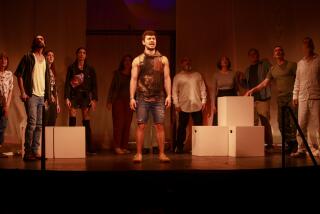Ever since the reforms of the Second...
- Share via
Ever since the reforms of the Second Vatican Council, Roman Catholic liturgists have been recasting worship in contemporary idioms. After two decades of updating, however, members of the University of San Diego campus ministry and music department are reviving a medieval liturgical drama titled “The Play of Daniel.”
The Renaissance-styled Founders Chapel on campus will be the setting for this 13th-Century play, which originated in Beauvais, France.
“The chapel has carved choir stalls all around the walls, which we will be using,” said project director William Eichorn. “There will be lots of processions led by a thurifer (an acolyte carrying a censer), and everyone will be wearing these ornate, brightly colored silk vestments which have not been used here since 1965.”
While liturgical drama is largely sung, it is usually embellished with instruments. “We don’t have period instruments, but we will be using recorders, some stringed instruments and lots of percussion,” said Eichorn, who directs the university’s opera workshop. If the music resembles Gregorian chant, Eichorn pointed out that some of it also reflects the dance rhythms of the late medieval period’s secular music.
According to Eichorn, these medieval plays were instructional pieces staged during church services, thus the term liturgical drama. They were dramatized biblical stories, animated counterparts to the elaborate scenes depicted in churches’ stained glass windows.
“The Play of Daniel” retells the biblical story of the prophet Daniel, who reads the writing on the wall at Belshazzar’s feast and later survives the lion’s den.
Although most of the text is in Latin, the portions that were in Old French have been translated into modern English for this performance. To further understanding of this antique drama, USD English Prof. Ron Hill will read a poetic commentary to the play written by W.H. Auden.
“Auden gives a rendering of the text, but keeps the story line going by giving the parts of the Book of Daniel which the chant and stylized action leave out,” Hill said. “In a way, this narration takes the part of the chorus.”
Hill, whose specialty is Shakespeare and Renaissance drama, sides with those scholars who point to medieval liturgical drama as the birthplace of the modern Western drama. “There is no question in my mind that the line is very clear from liturgical drama--the early Easter tropes and the more fully developed Christmas ‘The Second Shepherd’s Play’--to Renaissance drama,” Hill said.
Thirty actors and singers will enact “The Play of Daniel,” including Cole Manes, chairman of the USC biology department, as Belshazzar and Father Nicolas Reveles as Daniel.
According to Eichorn, the play has not been performed in San Diego before. Since USD has recently received a large grant from the Hahn Foundation to found a program for liturgical music at the school, Eichorn and his colleagues decided that they would start at the beginning with liturgical drama.
The work will be presented at 8 p.m. today and Saturday.
More to Read
The biggest entertainment stories
Get our big stories about Hollywood, film, television, music, arts, culture and more right in your inbox as soon as they publish.
You may occasionally receive promotional content from the Los Angeles Times.










